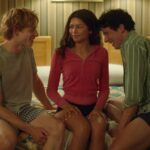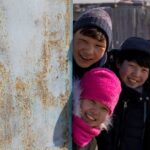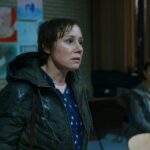Half of a Yellow Sun, based on the Orange Prize winning novel by Chimamanda Ngozi Adichie, is the directorial debut of the Nigerian/British novelist and playwright Biyi Bandele-Thomas. Biyi Bandele was born in 1967, the official start of the Biafran War (1967-1970) which ravages the lives of the film’s five central characters whose lives we follow from 1960 until 1970.
While the acting, particularly the performances of Chiwetel Ejiofor (12 Years a Slave) and Thandie Newton (Crash), is strong, Biyi Bandele’s ambitious adaptation is an exercise in connecting plot points: a whistle-stop tour of the Biafran War that sucks the emotion out of the drama.
Judging that the story is complex enough without retaining the novel’s jumps back and forth between 1960 (when Nigeria became independent from Great Britain) and the Biafran war period, the film is told in a linear fashion.
It begins with two twin sister (although never have two actresses looked less like twins) each brilliant and independent in their own way, choosing their career paths. Olanna (Thandie Newton) is going to the University town of Nsukka to teach and be with her boyfriend, the intellectual (he has a doctorate) Odenigbo (Chiwetel Ejiofor) while her emotionally strong but aloof and pompous sister Kainene (Anika Noni Rose) is going to run part of her father’s business empire in Port Harcourt.
A white Englishman named Richard (Joseph Mawle) falls in love with Kainene. After rejecting him, she falls and in love and they eventually live together. Ugwu (John Boyega), who started working as a houseboy to Odenigbo when he was a child, is at first unsettled by the intrusion of Olanna, but soon the three are living together in harmony.
While political unrest paves the way for the Biafran war of secession, the lives of the five characters are fraught with soap-opera like crises. When Olanna discovers Odenigbo’s illegitimate daughter, she seduces Richard. Conveniently, the baby’s mother rejects the child and Olanna adopts it. They then have to deal with the interference of Odenigbo’s possessive mother (Onyeka Onwenu) who objects to Olanna. The secession of Biafra as a separate IgboRepublic is glossed with a scene showing a celebration and the hoisting of new flag in the form of half of a yellow sun.
Once the war starts, Olanna, Odenigbo, their daughter and Ugwu load up their car and move from town to town to escape the fighting between the Nigerian forces and the new (Igbo) Biafran state. Olanna’s parents escape to London, offering Olanna a plane ticket, which she refuses. Her wedding to Odenigbo (his mother has a sudden change of heart) is disrupted by bombing.
The loving couple grow closer as they become poorer until they finally end up living with Kainene and Richard at the outskirts of a refugee camp which Kainene runs. One day Kainene defies Richard’s advice and crosses the border to trade with the enemy, assuring her concerned sister that she will be back that evening. In this film, that means she won’t be.
In all of this, the British government’s destructive colonial policy of dividing Nigeria into three territories (with results similar to those in India) and the influence of the three predominant ethnic tribes. is never explained, perhaps understandably as the novel is long enough. But the omission of the Nigerian government’s use of starvation as a political tool and the international community’s reaction is conspicuously absent.
Every major incident, whether personal or political, is mapped with a quick scene or a line and then it’s off to the next one. The famine is barely mentioned and no one looks thin or seems particularly hungry. At one point Olanna mentions how their daughter has not grown since they left Nsukka, which is the closest we come to the fatal consequences of the milk (and other food) shortage.
While the war scenes (most of the film was shot in Nigeria) with bands of marauding armies slaughtering men, women and children are well handled and look authentic, they lack the force of those in Hotel Rwanda. Ejiofor, whose parents are Nigerian, and Newton are thoroughly believable both as intellectuals lost in a senseless war and as lovers. But Biyi Bandele has bitten off more than he can chew, resulting in a worthy, but mechanical, frustrating and unsatisfying film
Joyce Glasser




